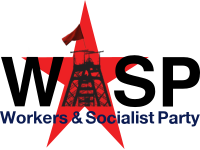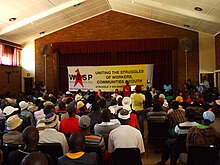
The Congress of South African Trade Unions is a trade union federation in South Africa. It was founded in 1985 and is the largest of the country's three main trade union federations, with 21 affiliated trade unions.
Zwelinzima Vavi is the former general secretary of the Congress of South African Trade Unions (COSATU), and vice-chairperson of the Millennium Labour Council.
Lonmin plc, formerly Lonrho plc, was a British producer of platinum group metals operating in the Bushveld Complex of South Africa. It was listed on the London Stock Exchange. Its registered office was in London, and its operational headquarters were in Johannesburg, South Africa.
Anglo American Platinum Limited is the world's largest primary producer of platinum, accounting for about 38% of the world's annual supply.
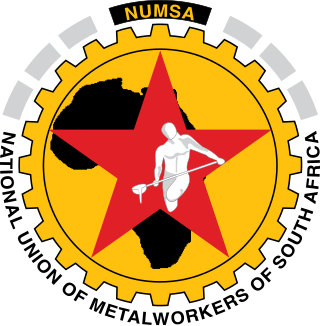
The National Union of Metalworkers of South Africa (NUMSA) is the biggest single trade union in South Africa with more than 338,000 members, and prior to its expulsion on 8 November 2014, the largest affiliate of the Congress of South African Trade Unions (COSATU), the country's largest trade union federation.
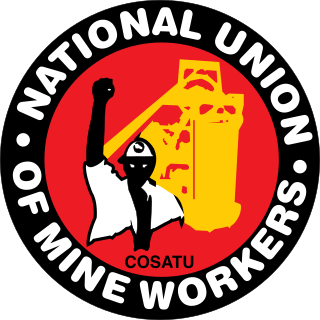
The National Union of Mineworkers (NUM) is a mainly mining industry related trade union, an organisation of workers with common goals through organised labour, in South Africa. With a membership of 300,000 as of 2014, it is the largest affiliate of the Congress of South African Trade Unions (COSATU).
Trade unions in South Africa has a history dating back to the 1880s. From the beginning unions could be viewed as a reflection of the racial disunity of the country, with the earliest unions being predominantly for white workers. Through the turbulent years of 1948–1991 trade unions played an important part in developing political and economic resistance, and eventually were one of the driving forces in realising the transition to an inclusive democratic government.
The Democratic Socialist Movement (DSM) is a Trotskyist political party in Nigeria. It is affiliated to the Committee for a Workers' International, of which it is the second largest section.
The African Mine Workers' Strike was a labour dispute involving mine workers of Witwatersrand in South Africa. It started on 12 August, 1946 and lasted approximately a week. The strike was attacked by police and over the week, at least 1,248 workers were wounded and at least 9 killed.

Susan Shabangu is a South African politician who has been a member of parliament representing the African National Congress since May 1994. She previously held the position of Minister of Social Development. Prior to that, she served as the inaugural Minister of Women in the Presidency, created by President Jacob Zuma in May 2014. She was the Minister of Mineral Resources from 2009 to 2014.
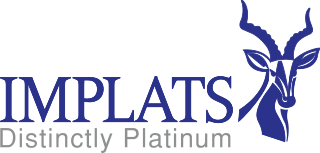
Impala Platinum Holdings Limited or Implats is a South African holding company that owns several companies which operate mines that produce platinum and platinum group metals, as well as nickel, copper and cobalt. Its most significant mine is the Impala mine in the North West province of South Africa. The company also owns or has interest in the Two Rivers mine and the Marula mine in the South Africa Bushveld Igneous Complex and the Mimosa mine and Zimplats in Zimbabwe, as well as the Impala Refining Services which smelts and refines metals for other companies. In December 2019, Impala Canada was formed, owned by the holding company, out of the acquisition of North American Palladium and its mine in Ontario, Canada.

The Marikana massacre was the killing of thirty-four miners by the South African Police Service (SAPS) on 16 August 2012 during a six-week wildcat strike at the Lonmin platinum mine at Marikana near Rustenburg in South Africa's North West province. The massacre constituted the most lethal use of force by South African security forces against civilians since the Soweto uprising in 1976 and has been compared to the 1960 Sharpeville massacre.

The Association of Mineworkers and Construction Union (AMCU) was formed in Mpumalanga, South Africa, in 1998 as a breakaway faction of the COSATU-affiliated National Union of Mineworkers (NUM). It was formally registered as a union in 2001. According to Mining Weekly, the union sees itself as distinct from NUM in that it is "apolitical and noncommunist".
On 15 November 2014 workers at South Africa's major platinum producers – Anglo American Platinum, Impala Platinum, and Lonmin – went on strike demanding that wages be immediately doubled. However, after five months of striking they settled for a more modest pay increase spread over three years. It was the longest and most expensive strike in South African history.

Sibanye-Stillwater is a multinational mining and metals processing Group with a diverse portfolio of mining and processing operations and projects and investments across five continents. The Group is also one of the foremost global PGM auto catalytic recyclers and has interests in leading mine tailings retreatment operations.
Irvin Jim is a South African trade union leader.
The United Front was formally launched in South Africa in 2015, following a preparatory activities in 2014, including a summit in November of 350 delegates representing labour unions, social movements and popular organisations, faith-based organisations, NGOs and anti-capitalist formations. It was launched with the support of the National Union of Metalworkers of South Africa (NUMSA), which severed ties with the African National Congress and South African Communist Party at its December 2013 congress and to foster left-wing alternatives. While NUMSA defined itself as Marxist-Leninist, it envisaged the United Front as open to a range of forces, and as distinct from NUMSA itself. Significant differences of opinion emerged in the United Front from an early stage. The United Front effectively supplanted the Democratic Left Front, a smaller formation which had been established in 2011, itself founded following the collapse of the Anti-Privatisation Forum. Given the connection to NUMSA, both the Congress of South African Trade Unions (COSATU) which had expelled NUMSA, and the South African Communist Party, remained outside the United Front, the party proposing an alternative "left popular front" (LPF).

The Socialist Revolutionary Workers Party (SRWP) is a Marxist-Leninist communist party in South Africa. The party was founded in March 2019 after a pre-launch convention at the end of 2018.
Tyotyo Hubert James is a South African politician and trade union leader who is the Chairperson of the Portfolio Committee on Public Service and Administration, Performance Monitoring & Evaluation and a Member of the National Assembly for the African National Congress (ANC). He had previously served as the first deputy president of the Congress of South African Trade Unions (COSATU).
Msokoli Frans Baleni is a South African businessman and former trade unionist who was general secretary of the National Union of Mineworkers between 2006 and 2015. Since 2007, he has been a member of the Central Committee of the South African Communist Party.
